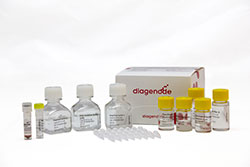Therapy-induced DNA methylation inactivates MCT1 and renders tumor cells vulnerable to MCT4 inhibition
Catherine Vander Linden, Cyril Corbet, Estelle Bastien, Ruben Martherus, Céline Guilbaud, Laurenne Petit, Loris Wauthier, Axelle Loriot, Charles De Smet, Olivier Feron
Metabolic plasticity in cancer cells makes use of metabolism-targeting agents very challenging. Drug-induced metabolic rewiring may, however, uncover vulnerabilities that can be exploited. We report that resistance to glycolysis inhibitor 3-bromopyruvate (3-BrPA) arises from DNA methylation in treated cancer cells and subsequent silencing of the monocarboxylate transporter MCT1. We observe that, unexpectedly, 3-BrPA-resistant cancer cells mostly rely on glycolysis to sustain their growth, with MCT4 as an essential player to support lactate flux. This shift makes cancer cells particularly suited to adapt to hypoxic conditions and resist OXPHOS inhibitors and anti-proliferative chemotherapy. In contrast, blockade of MCT4 activity in 3-BrPA-exposed cancer cells with diclofenac or genetic knockout, inhibits growth of derived spheroids and tumors in mice. This study supports a potential mode of collateral lethality according to which metabolic adaptation of tumor cells to a first-line therapy makes them more responsive to a second-line treatment.

